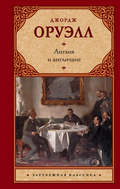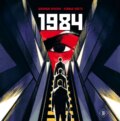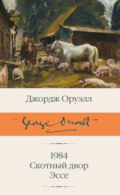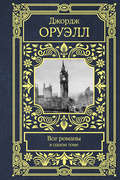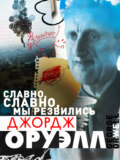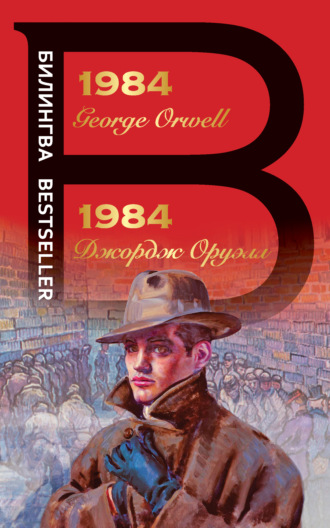
Джордж Оруэлл
1984
II
Взявшись за дверную ручку, Уинстон обратил внимание на раскрытые страницы дневника на столе. «ДОЛОЙ БОЛЬШОГО БРАТА» повторялось на них столько раз и такими крупными буквами, что можно было разглядеть надписи через всю комнату. Немыслимая глупость! Несмотря на панику, он понял, что не хочет пачкать кремовую бумагу, захлопывая тетрадь, прежде чем просохнут чернила.
Уинстон вздохнул и открыл дверь. Облегчение теплой волной прокатилось по всему телу. За дверью стояла потрепанного вида женщина, невзрачная, с жидкими всклокоченными волосами и морщинистым лицом.
– Ох, товарищ, – затянула она тоскливым голосом, – я услыхала, вы вроде дома. Вы бы не зашли к нам посмотреть раковину на кухне? Она засорилась и…
Это была миссис Парсонс, жена соседа по этажу. (Партия почему-то не одобряла слово «миссис» – полагалось ко всем обращаться «товарищ», – но некоторых женщин называть иначе язык не поворачивался.) Женщина лет тридцати, но на вид гораздо старше. Казалось, в ее морщинах на лице залегла пыль. Уинстон пошел за ней по коридору. Слесарная самодеятельность стала едва ли не ежедневной морокой. Старый жилкомплекс «Победа» возвели годах в тридцатых – и весь он уже разваливался. С потолка и стен постоянно сыпалась штукатурка, трубы лопались при каждом крепком морозе, крыша текла всякий раз, как выпадал снег, а отопление обычно работало на половинном давлении, если его не отключали совсем из соображений экономии. Если ты не мог починить чего-то сам, то приходилось ждать распоряжений неуловимых комитетов, которые даже с ремонтом оконной рамы могли тянуть по два года.
– Я ведь только потому, что Том не дома, – пробормотала миссис Парсонс.
Квартира Парсонсов была больше, чем у Уинстона, и убожество ее выражалось иначе. Все вещи имели потрепанный, побитый вид, как будто здесь только что побывал крупный злобный зверь. По всему полу валялись спортивные принадлежности – хоккейные клюшки, боксерские перчатки, лопнувший футбольный мяч, вывернутые наизнанку потные шорты, – а на столе громоздилась грязная посуда и замызганные школьные тетради. На стенах алели знамена Молодежной лиги и лиги Разведчиков, и висел полноразмерный плакат Большого Брата. Пахло здесь, как и во всем доме, вареной капустой, но привычный запах оттеняла острая вонь едкого пота, которую оставил после себя кто-то отсутствующий в данный момент. Такие подробности по неизвестной причине становились понятны с первого вдоха. В соседней комнате кто-то трещал клочком туалетной бумаги по зубьям расчески, неумело подыгрывая военной музыке, продолжавшей звучать с телеэкрана.
– Это дети, – сказала миссис Парсонс, бросив тревожный взгляд на дверь. – Они сегодня не гуляли. И, конечно…
У нее была привычка обрывать предложения на середине. Раковина на кухне почти до краев заполнилась грязной зеленоватой водой, смердевшей хуже капусты. Уинстон опустился на колени и осмотрел угловую муфту на сливной трубе. Он терпеть не мог работать руками, терпеть не мог нагибаться – и всегда от этого кашлял. Миссис Парсонс стояла рядом с беспомощным видом.
– Был бы дома Том, он бы вмиг прочистил, – сказала она. – Он любит такими делами заниматься. Мастер на все руки.
Парсонс, как и Уинстон, работал в Министерстве правды. Это был полный, но неугомонный малый, тупой до невозможности сгусток кретинского энтузиазма – один из тех беспрекословных преданных трудяг, на которых Партия опиралась надежнее, чем на Мыслеполицию. Только в тридцать пять он с неохотой оставил ряды Молодежной лиги, а до этого умудрился пробыть в Разведчиках на год дольше положенного. В министерстве он занимал какую-то незначительную должность, для которой не требовалось особого ума, зато стал ведущей фигурой в Спортивном комитете и в целом ряде других структур для организации турпоходов, стихийных демонстраций, кампаний по экономии и прочих добровольных начинаний. Попыхивая трубкой, он не без гордости сообщал товарищам, что вот уже четыре года, как он не пропустил ни одного вечера в Центре досуга. Его всегда сопровождал одуряющий запах пота, являясь невольным знаком усердной жизнедеятельности и еще долго витая в помещении даже после ухода Парсонса.
– У вас есть гаечный ключ? – спросил Уинстон, тронув гайку на муфте.
– Гаечный, – сказала миссис Парсонс, обмякая на глазах. – Я даже не знаю. Может, дети…
Раздался топот, очередная трель расчески – и в комнату вкатились дети. Миссис Парсонс принесла гаечный ключ. Уинстон спустил воду и с отвращением извлек из трубы клок волос. Он, как мог, отмыл пальцы под холодной водой и вернулся в другую комнату.
– Руки вверх! – рявкнул свирепый голос.
Из-за стола вынырнул симпатичный крепыш лет девяти, наставляя на него игрушечный автоматический пистолет, а его сестренка, младше года на два, направила на Уинстона деревяшку. Оба были одеты в форму Разведчиков: синие шорты, серые рубашки, красные галстуки. Уинстон с беспокойством поднял руки над головой – мальчик держался так злобно, что это не было похоже на игру.
– Ты предатель! – завопил он. – Мыслефелон! Ты евразийский шпион! Я тебя застрелю, испарю, я тебя отправлю в соляные шахты!
И они оба принялись скакать вокруг Уинстона, вереща «Предатель!» и «Мыслефелон!» – девочка повторяла каждое движение за братом. Это немного пугало, как возня тигрят, которые скоро вырастут в людоедов. В глазах мальчика виднелась какая-то свирепая расчетливость, почти неодолимое желание ударить Уинстона и понимание того, что очень скоро это будет ему по силам. Уинстон подумал, как ему повезло, что у мальчика не настоящий пистолет.
Взгляд миссис Парсонс нервозно перебегал между гостем и детьми. В гостиной было светлее, и он с интересом отметил, что в морщинах на ее лице действительно засела пыль.
– Они что-то расшумелись, – сказала она. – Не понравилось, что их не возьмут на повешение, вот почему. Мне с ними некогда, а Том к тому времени еще не вернется с работы.
– Почему нам нельзя посмотреть, как вешают? – возмущенно завопил мальчик.
– Хочу смотреть, как вешают! Хочу смотреть, как вешают! – заголосила девочка, продолжая скакать.
Уинстон вспомнил, что сегодня вечером в парке будут публично вешать евразийских военных преступников. Такое зрелищное мероприятие устраивали примерно раз в месяц. Дети вечно просились со взрослыми. Он вышел от миссис Парсонс и направился к себе, но не прошел по коридору и шести шагов, как что-то больно ужалило его сзади в шею. Словно воткнули обрывок раскаленной проволоки. Уинстон резко обернулся и увидел, как миссис Парсонс затаскивает в дверь сына, прячущего в карман рогатку.
– Голдштейн! – заорал мальчик, исчезая за дверью.
Больше всего Уинстона изумило выражение беспомощного страха на сером лице матери.
Вернувшись к себе, он быстро прошел мимо телеэкрана и снова сел за стол, потирая шею. Музыка уже не играла. Теперь отрывистый военный голос, кровожадно смакуя подробности, зачитывал описание вооружений новой Плавучей крепости, только что вставшей на якорь между Исландией и Фарерскими островами.
Уинстон подумал, что с такими детьми эта несчастная женщина живет в постоянном страхе. Еще год-другой, и они начнут следить за ней днем и ночью, норовя уличить хоть в чем-нибудь. Теперь почти все дети ужасны. Хуже всего, что с помощью таких организаций, как Разведчики, их методично превращают в необузданных маленьких дикарей, но у них не возникает желания бунтовать против партийной дисциплины. Напротив, они обожают Партию и все, что с ней связано. Песни, парады, знамена, походы, муштра с учебными винтовками, громкие лозунги, восхваление Большого Брата – все это им представляется захватывающей игрой. Их натравливают на чужаков, на врагов Режима, на иностранцев, предателей, вредителей, мыслефелонов. Для людей старше тридцати стало в порядке вещей бояться собственных детей. И не без причины, ведь почти каждую неделю «Таймс» публикует заметки, как очередной мелкий ябедник – «маленький герой», как их обычно называют – грел дома уши и донес на родителей в Мыслеполицию, услышав подозрительные высказывания.
Боль в шее уже утихла. Уинстон взял ручку со смешанными чувствами, не зная, стоит ли занести в дневник что-то еще. Ему на ум вдруг снова пришел О’Брайен.
Несколько лет назад (сколько же именно – лет семь, пожалуй?) Уинстону приснилось, что он идет по комнате в кромешной тьме. И кто-то, сидевший чуть в стороне, говорит ему: «Мы встретимся там, где нет темноты». Это было сказано совсем тихо, почти между делом – замечание, а не приказ. Уинстон пошел дальше, не остановившись. Как ни странно, во сне он не придал значения этим словам. Только со временем, постепенно они стали обретать смысл. Он не мог теперь припомнить, увидел ли этот сон до или после знакомства с О’Брайеном, как не мог припомнить и когда он впервые решил, что слышал во сне именно его голос. Так или иначе голос он этот опознал. В темноте к нему обращался O’Брайен.
Уинстон никак не мог уяснить – даже после утреннего обмена взглядами – друг или враг ему О’Брайен. Хотя это как будто было не так уж и важно. Между ними промелькнуло понимание, значившее больше, чем взаимное расположение или заговорщицкий дух.
«Мы встретимся там, где нет темноты», – так он сказал.
Уинстон не понимал, что это значит, – знал только, что слова из сна так или иначе сбудутся.
Голос с телеэкрана прервался. В душном воздухе комнаты раздался звук фанфар, чистый и прекрасный. Голос проговорил со скрежетом:
«Внимание! Прошу внимания! Только что поступила сводка-молния с Малабарского фронта. Наши войска в Южной Индии одержали блестящую победу. Я уполномочен заявить, что настоящее событие вполне может приблизить завершение войны в обозримом будущем. Передаю сводку новостей…»
Уинстон подумал, что надо ждать плохих известий. И действительно: за кровавым описанием разгрома евразийской армии с колоссальными цифрами убитых и взятых в плен последовало объявление, что со следующей недели норма шоколадного рациона сокращается с тридцати граммов до двадцати.
Уинстон снова рыгнул. Джин почти выветрился, оставляя после себя чувство подавленности. Телеэкран разразился песней «Во славу твою, Океания» – то ли в честь победы, то ли чтобы отвлечь людей от сокращения шоколадного пайка. Полагалось встать по стойке «смирно», но Уинстон находился вне зоны видимости телеэкрана.
«Во славу твою, Океания» сменилась легкой музыкой. Уинстон подошел к окну, держась спиной к телеэкрану. День был все такой же холодный и ясный. Где-то вдалеке с глухим раскатистым грохотом взорвалась ракета. На Лондон их сбрасывали от двадцати до тридцати в неделю.
На улице ветер продолжал трепать оторванный угол плаката, то открывая, то скрывая слово «АНГСОЦ». Ангсоц. Священные устои Ангсоца.
Новояз, двоемыслие, пластичность прошлого. Уинстон почувствовал себя так, будто бредет по морскому дну через лес водорослей, затерявшись в монструозном мире, где и сам он – монстр. Он был один. Прошлое – мертво, будущее – невообразимо. Как он мог быть уверен, что на его стороне хоть одно человеческое существо из ныне живущих? И разве можно знать, что владычество Партии не будет вечным? Вместо ответа он прочитал три лозунга на белом фасаде Министерства правды:
ВОЙНА – ЭТО МИР
СВОБОДА – ЭТО РАБСТВО
НЕЗНАНИЕ – ЭТО СИЛА
Уинстон достал из кармана монетку в двадцать пять центов. На ней значились те же три лозунга, набранные аккуратным мелким шрифтом, а на оборотной стороне – лицо Большого Брата. Даже с монеты за тобой наблюдали эти глаза. Они были везде: на монетах, марках, книжных обложках, на знаменах и плакатах, на сигаретных пачках. Ты всегда чувствовал на себе взгляд и слышал вкрадчивый голос. Во сне и наяву, на работе и за едой, дома и на улице, в ванной и в постели – никуда от этого не деться. Не оставалось ничего своего, кроме нескольких кубических сантиметров внутри черепной коробки.
Солнце ушло, и мириады окон Министерства правды перестали отражать его свет, потемнев, как бойницы крепости. Сердце Уинстона сжалось при виде исполинской пирамиды. Она слишком прочна, ее не взять штурмом. И тысяча ракет не сможет сровнять ее с землей. Он снова задумался, ради кого пишет дневник. Ради будущего, ради прошлого – ради века, может, лишь воображаемого. Перед ним же маячила не смерть, но бесследное уничтожение. Дневник превратится в пепел, а сам он просто испарится. Его слова прочтет только Мыслеполиция, прежде чем стереть их с лица земли и из истории. Как можно обращаться к будущему, когда от тебя не останется никакого следа в этом мире, даже анонимных слов, нацарапанных на клочке бумаги?
Телеэкран пробил четырнадцать часов. До выхода десять минут. Он должен вернуться на работу к четырнадцати тридцати.
Бой часов, как ни странно, вернул ему присутствие духа. Уинстон был одиноким призраком, изрекавшим правду, которую никто никогда не услышит. Но пока он ее изрекает, связь времен таинственным образом продолжается. Ты несешь в себе человеческое начало не тогда, когда тебя слушают, а когда ты сохраняешь ясное сознание. Он вернулся к столу, обмакнул перо в чернила и написал:
Будущему или прошлому, времени, когда мысль свободна, когда люди отличаются друг от друга и не живут в одиночку – времени, когда существует правда, и что сделано, то сделано:
Из века одинаковых, из века одиночек, из века Большого Брата, из века двоемыслия – приветствую тебя!
Он подумал, что уже мертв. Ему показалось, что только сейчас, когда он обрел способность формулировать мысли, он пересек черту. Последствия любого действия заключены в самом этом действии. Он написал:
Мыслефелония не влечет за собой смерть: мыслефелония ЕСТЬ смерть.
Теперь, когда он признал в себе мертвеца, стало важным оставаться в живых как можно дольше. Два пальца правой руки запачкались чернилами. Как раз такая деталь и может выдать. Какой-нибудь востроносый ревнитель в министерстве (скорее всего, женщина: хотя бы та маленькая, рыжеватая или темноволосая из Художественного отдела) мог задуматься, почему Уинстон писал в обеденный перерыв, почему писал старомодной ручкой, что он писал – и обмолвиться об этом в нужном месте. Уинстон пошел в ванную и тщательно отмыл чернила зернистым бурым мылом, которое терло кожу, как наждачная бумага, и потому хорошо подходило для такой задачи.
Дневник он убрал в ящик. Пытаться как-то спрятать его было бессмысленно, но он мог хотя бы принять меры, чтобы заметить, если тетрадь обнаружат. Волос на краю страницы был бы слишком очевиден. Он подобрал кончиком пальца едва заметную белесую пылинку и поместил на угол обложки, где она будет покоиться, пока дневник кто-нибудь не возьмет в руки.
III
Winston was dreaming of his mother.
He must, he thought, have been ten or eleven years old when his mother had disappeared. She was a tall, statuesque, rather silent woman with slow movements and magnificent fair hair. His father he remembered more vaguely as dark and thin, dressed always in neat dark clothes (Winston remembered especially the very thin soles of his father’s shoes) and wearing spectacles. The two of them must evidently have been swallowed up in one of the first great purges of the fifties.
At this moment his mother was sitting in some place deep down beneath him, with his young sister in her arms. He did not remember his sister at all, except as a tiny, feeble baby, always silent, with large, watchful eyes. Both of them were looking up at him. They were down in some subterranean place – the bottom of a well, for instance, or a very deep grave – but it was a place which, already far below him, was itself moving downwards. They were in the saloon of a sinking ship, looking up at him through the darkening water. There was still air in the saloon, they could still see him and he them, but all the while they were sinking down, down into the green waters which in another moment must hide them from sight for ever. He was out in the light and air while they were being sucked down to death, and they were down there because he was up here. He knew it and they knew it, and he could see the knowledge in their faces. There was no reproach either in their faces or in their hearts, only the knowledge that they must die in order that he might remain alive, and that this was part of the unavoidable order of things.
He could not remember what had happened, but he knew in his dream that in some way the lives of his mother and his sister had been sacrificed to his own. It was one of those dreams which, while retaining the characteristic dream scenery, are a continuation of one’s intellectual life, and in which one becomes aware of facts and ideas which still seem new and valuable after one is awake. The thing that now suddenly struck Winston was that his mother’s death, nearly thirty years ago, had been tragic and sorrowful in a way that was no longer possible. Tragedy, he perceived, belonged to the ancient time, to a time when there was still privacy, love, and friendship, and when the members of a family stood by one another without needing to know the reason. His mother’s memory tore at his heart because she had died loving him, when he was too young and selfish to love her in return, and because somehow, he did not remember how, she had sacrificed herself to a conception of loyalty that was private and unalterable. Such things, he saw, could not happen today. Today there were fear, hatred, and pain, but no dignity of emotion, no deep or complex sorrows. All this he seemed to see in the large eyes of his mother and his sister, looking up at him through the green water, hundreds of fathoms down and still sinking.
Suddenly he was standing on short springy turf, on a summer evening when the slanting rays of the sun gilded the ground. The landscape that he was looking at recurred so often in his dreams that he was never fully certain whether or not he had seen it in the real world. In his waking thoughts he called it the Golden Country. It was an old, rabbit bitten pasture, with a foot track wandering across it and a molehill here and there. In the ragged hedge on the opposite side of the field the boughs of the elm trees were swaying very faintly in the breeze, their leaves just stirring in dense masses like women’s hair. Somewhere near at hand, though out of sight, there was a clear, slow moving stream where dace were swimming in the pools under the willow trees.
The girl with dark hair was coming towards them across the field. With what seemed a single movement she tore off her clothes and flung them disdainfully aside. Her body was white and smooth, but it aroused no desire in him, indeed he barely looked at it. What overwhelmed him in that instant was admiration for the gesture with which she had thrown her clothes aside. With its grace and carelessness it seemed to annihilate a whole culture, a whole system of thought, as though Big Brother and the Party and the Thought Police could all be swept into nothingness by a single splendid movement of the arm. That too was a gesture belonging to the ancient time. Winston woke up with the word “Shakespeare” on his lips.
The telescreen was giving forth an ear splitting whistle which continued on the same note for thirty seconds. It was nought seven fifteen, getting up time for office workers. Winston wrenched his body out of bed – naked, for a member of the Outer Party received only 3,000 clothing coupons annually, and a suit of pyjamas was 600 – and seized a dingy singlet and a pair of shorts that were lying across a chair. The Physical Jerks would begin in three minutes. The next moment he was doubled up by a violent coughing fit which nearly always attacked him soon after waking up. It emptied his lungs so completely that he could only begin breathing again by lying on his back and taking a series of deep gasps. His veins had swelled with the effort of the cough, and the varicose ulcer had started itching.
“Thirty to forty group!” yapped a piercing female voice. “Thirty to forty group! Take your places, please. Thirties to forties!”
Winston sprang to attention in front of the telescreen, upon which the image of a youngish woman, scrawny but muscular, dressed in tunic and gym shoes, had already appeared.
“Arms bending and stretching!” she rapped out. “Take your time by me. One, two, three, four! One, two, three, four! Come on, comrades, put a bit of life into it! One, two, three four! One, two, three, four!..”
The pain of the coughing fit had not quite driven out of Winston’s mind the impression made by his dream, and the rhythmic movements of the exercise restored it somewhat. As he mechanically shot his arms back and forth, wearing on his face the look of grim enjoyment which was considered proper during the Physical Jerks, he was struggling to think his way backward into the dim period of his early childhood. It was extraordinarily difficult. Beyond the late fifties everything faded. When there were no external records that you could refer to, even the outline of your own life lost its sharpness. You remembered huge events which had quite probably not happened, you remembered the detail of incidents without being able to recapture their atmosphere, and there were long blank periods to which you could assign nothing. Everything had been different then. Even the names of countries, and their shapes on the map, had been different. Airstrip One, for instance, had not been so called in those days: it had been called England or Britain, though London, he felt fairly certain, had always been called London.
Winston could not definitely remember a time when his country had not been at war, but it was evident that there had been a fairly long interval of peace during his childhood, because one of his early memories was of an air raid which appeared to take everyone by surprise. Perhaps it was the time when the atomic bomb had fallen on Colchester. He did not remember the raid itself, but he did remember his father’s hand clutching his own as they hurried down, down, down into some place deep in the earth, round and round a spiral staircase which rang under his feet and which finally so wearied his legs that he began whimpering and they had to stop and rest. His mother, in her slow, dreamy way, was following a long way behind them. She was carrying his baby sister – or perhaps it was only a bundle of blankets that she was carrying: he was not certain whether his sister had been born then. Finally they had emerged into a noisy, crowded place which he had realized to be a Tube station.
There were people sitting all over the stone flagged floor, and other people, packed tightly together, were sitting on metal bunks, one above the other. Winston and his mother and father found themselves a place on the floor, and near them an old man and an old woman were sitting side by side on a bunk. The old man had on a decent dark suit and a black cloth cap pushed back from very white hair: his face was scarlet and his eyes were blue and full of tears. He reeked of gin. It seemed to breathe out of his skin in place of sweat, and one could have fancied that the tears welling from his eyes were pure gin. But though slightly drunk he was also suffering under some grief that was genuine and unbearable. In his childish way Winston grasped that some terrible thing, something that was beyond forgiveness and could never be remedied, had just happened. It also seemed to him that he knew what it was. Someone whom the old man loved – a little granddaughter, perhaps – had been killed. Every few minutes the old man kept repeating:
“We didn’t ought to ’ave trusted ’em. I said so, Ma, didn’t I? That’s what comes of trusting ’em. I said so all along. We didn’t ought to ’ave trusted the buggers.”
But which buggers they didn’t ought to have trusted Winston could not now remember.
Since about that time, war had been literally continuous, though strictly speaking it had not always been the same war. For several months during his childhood there had been confused street fighting in London itself, some of which he remembered vividly. But to trace out the history of the whole period, to say who was fighting whom at any given moment, would have been utterly impossible, since no written record, and no spoken word, ever made mention of any other alignment than the existing one. At this moment, for example, in 1984 (if it was 1984), Oceania was at war with Eurasia and in alliance with Eastasia. In no public or private utterance was it ever admitted that the three powers had at any time been grouped along different lines. Actually, as Winston well knew, it was only four years since Oceania had been at war with Eastasia and in alliance with Eurasia. But that was merely a piece of furtive knowledge which he happened to possess because his memory was not satisfactorily under control. Officially the change of partners had never happened. Oceania was at war with Eurasia: therefore Oceania had always been at war with Eurasia. The enemy of the moment always represented absolute evil, and it followed that any past or future agreement with him was impossible.
The frightening thing, he reflected for the ten thousandth time as he forced his shoulders painfully backward (with hands on hips, they were gyrating their bodies from the waist, an exercise that was supposed to be good for the back muscles) – the frightening thing was that it might all be true. If the Party could thrust its hand into the past and say of this or that event, it never happened – that, surely, was more terrifying than mere torture and death?
The Party said that Oceania had never been in alliance with Eurasia. He, Winston Smith, knew that Oceania had been in alliance with Eurasia as short a time as four years ago. But where did that knowledge exist? Only in his own consciousness, which in any case must soon be annihilated. And if all others accepted the lie which the Party imposed – if all records told the same tale – then the lie passed into history and became truth.
“Who controls the past,” ran the Party slogan, “controls the future: who controls the present controls the past.”
And yet the past, though of its nature alterable, never had been altered. Whatever was true now was true from everlasting to everlasting. It was quite simple. All that was needed was an unending series of victories over your own memory. “Reality control”, they called it: in Newspeak, “doublethink”.
“Stand easy! ” barked the instructress, a little more genially.
Winston sank his arms to his sides and slowly refilled his lungs with air. His mind slid away into the labyrinthine world of doublethink. To know and not to know, to be conscious of complete truthfulness while telling carefully constructed lies, to hold simultaneously two opinions which cancelled out, knowing them to be contradictory and believing in both of them, to use logic against logic, to repudiate morality while laying claim to it, to believe that democracy was impossible and that the Party was the guardian of democracy, to forget whatever it was necessary to forget, then to draw it back into memory again at the moment when it was needed, and then promptly to forget it again: and above all, to apply the same process to the process itself. That was the ultimate subtlety: consciously to induce unconsciousness, and then, once again, to become unconscious of the act of hypnosis you had just performed. Even to understand the word “doublethink” involved the use of doublethink.
The instructress had called them to attention again.
“And now let’s see which of us can touch our toes!” she said enthusiastically. “Right over from the hips, please, comrades. One, two! One, two!..”
Winston loathed this exercise, which sent shooting pains all the way from his heels to his buttocks and often ended by bringing on another coughing fit. The half pleasant quality went out of his meditations. The past, he reflected, had not merely been altered, it had been actually destroyed. For how could you establish even the most obvious fact when there existed no record outside your own memory? He tried to remember in what year he had first heard mention of Big Brother. He thought it must have been at some time in the sixties, but it was impossible to be certain. In the Party histories, of course, Big Brother figured as the leader and guardian of the Revolution since its very earliest days. His exploits had been gradually pushed backwards in time until already they extended into the fabulous world of the forties and the thirties, when the capitalists in their strange cylindrical hats still rode through the streets of London in great gleaming motor cars or horse carriages with glass sides. There was no knowing how much of this legend was true and how much invented. Winston could not even remember at what date the Party itself had come into existence. He did not believe he had ever heard the word Ingsoc before 1960, but it was possible that in its Oldspeak form – “English Socialism”, that is to say – it had been current earlier. Everything melted into mist. Sometimes, indeed, you could put your finger on a definite lie. It was not true, for example, as was claimed in the Party history books, that the Party had invented aeroplanes. He remembered aeroplanes since his earliest childhood. But you could prove nothing. There was never any evidence. Just once in his whole life he had held in his hands unmistakable documentary proof of the falsification of an historical fact. And on that occasion —
“Smith!” screamed the shrewish voice from the telescreen. “6079 Smith W.! Yes, you! Bend lower, please! You can do better than that. You’re not trying. Lower, please! That’s better, comrade. Now stand at ease, the whole squad, and watch me.”
A sudden hot sweat had broken out all over Winston’s body. His face remained completely inscrutable. Never show dismay! Never show resentment! A single flicker of the eyes could give you away. He stood watching while the instructress raised her arms above her head and – one could not say gracefully, but with remarkable neatness and efficiency – bent over and tucked the first joint of her fingers under her toes.
“There, comrades! That’s how I want to see you doing it. Watch me again. I’m thirty nine and I’ve had four children. Now look.” She bent over again. “You see my knees aren’t bent. You can all do it if you want to,” she added as she straightened herself up. “Anyone under forty five is perfectly capable of touching his toes. We don’t all have the privilege of fighting in the front line, but at least we can all keep fit. Remember our boys on the Malabar front! And the sailors in the Floating Fortresses! Just think what they have to put up with. Now try again. That’s better, comrade, that’s much better,” she added encouragingly as Winston, with a violent lunge, succeeded in touching his toes with knees unbent, for the first time in several years.



